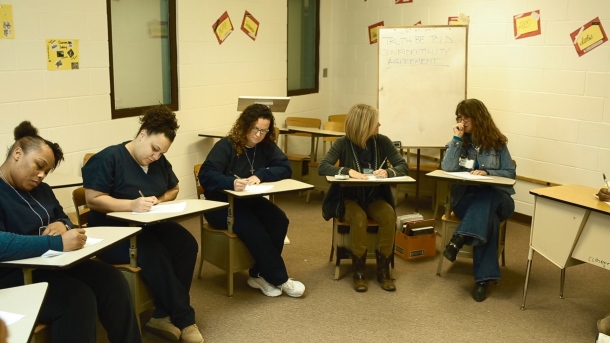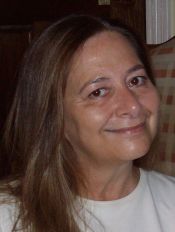We have started our 2015 fall semester in the prisons, so it is a good time to answer questions we get asked frequently. “Are there differences in the prisons you go to?” “Are the women the same wherever you go?” “How is jail different from prison?”
Truth Be Told provides programs for women behind bars at five correctional facilities and each one has unique features and different offender populations. Even though the women we meet are living in different environments and facing diverse futures, from an upcoming release date to a 30 year sentence, they have similar needs. We all share the need to be seen, heard and loved. We strive to make meaning of our journeys through self-reflection and sharing our stories. We heal by being authentic and vulnerable in a safe community.
Texas Department of Criminal Justice (TDCJ) gives every inmate a custody designation and each prison houses certain custody levels from the least restrictive at G1 to the most secure at G5 and then Administrative Segregation. The TDCJ Offender Orientation Handbook explains:
“On the unit of assignment, an offender is given a custody designation which indicates several things. It tells where and with whom he can live, how much supervision he will need, and what job he can be assigned to. An offender’s custody level depends on his current institutional behavior, his previous institutional behavior, and his current offense and sentence length. If the offender violates any rules, he may be placed in a more restrictive custody. If the offender complies with the rules, he may be assigned a less restrictive custody level.”
Lockhart Correctional Facility is the only privately run prison we work in. At the end of August, the Management and Training Corporation (MTC) will assume administration of the prison. In 2015, the Lockhart Unit was converted to an all-female facility that houses 1,000 inmates. We look forward to working with MTC because of their emphasis on education and training and the use of Gender Responsive practices. The Lockhart Unit is where Truth Be Told began fifteen years ago and where we have always offered the most programing. Lockhart houses the least restrictive, G1 and G2, custody level inmates and has an onsite prison work program in partnership with a private company. This is the only facility where we offer Let’s Get Real to help women with a release date of nine months or less prepare for returning to the community.
TDCJ Hilltop Unit is in Gatesville. This is a smaller facility with about 500 inmates with G1-3 custody levels. Our monthly Exploring Creativity Workshops are provided for the 28 women who are housed together in the Sex Offender Treatment Program (SOTP). These women really appreciate the creative aspects TBT brings to promote healing, such as writing, movement, and improvisation.
TDCJ psychologist, Anne Mooney, LCSW Program Supervisor, asserts, “Women who commit sexual offenses have a distorted understanding of emotional relationships. Within the therapeutic community, offenders have an opportunity to develop and practice healthier ways of interacting. Women gain the skills to identify and meet their emotional needs. The treatment requires tough honesty, but they agree that the healing is worth it.”
TDCJ Dr. Lane Murray Unit is another of the cluster of women’s prisons in Gatesville. It houses 1,341 women with G1-4 custody levels and is the only prison we go to that has Administrative Segregation or “Ad Seg” which the Handbook explains as:
“Administrative segregation, refers to offenders who must be separated from the general population because they are dangerous, either to other offenders or staff, or they are in danger from other offenders… These offenders leave their cells, for the most part, only for showers and limited recreation.”
Women in Ad Seg can’t attend our programs, but just walking by their building drives home the harsher realities of prisons; they call out from their windows and toss pieces of paper to get attention. The Murray Unit is where we have come to know more women with longer sentences, 20 years, 35 years, whose convictions are connected to more grievous crimes. The dynamics of working with women who are facing many years in prison are leading us to shape our programs to their unique needs.
The Lady Lifers: A moving song from women in prison for life is a video from TEDx at Muncy State Prison that expresses some of their emotions.

Federal Prison Camp in Bryan, a minimum security prison with 847 women, is the only federal-level facility we visit. It sits on a former community college campus that isn’t even completely fenced. The inmates are non-violent offenders with average sentences of five years. They know that if they left the grounds they would be moved to maximum security and have years added to their sentences. Even though the facility has an abundance of programs, the administration asked Truth Be Told to provide Talk To Me because it is unlike any other program. Facilitating at FPC Bryan feels a little like going to a community college to teach a class.
Travis County Jail in Del Valle houses about 2,500 men and women in a variety of stages with the criminal justice system. We work with women in two programs that the jail Social Services Director administers, PRIDE for the general population and PEACE for women in maximum security. Women get in the program because they expect to be there for at least a few weeks, but most are working their way through the court system and have not yet been sentenced. They are dealing with legal uncertainties (what their final charges will be, what court they will go to, and what type of plea bargain they will be offered) and emotional personal uncertainties (who will take care of their children, will their families stand by them). Because of these factors Making Connections is 20 stand-alone classes that help with emotional well being and self-management.










